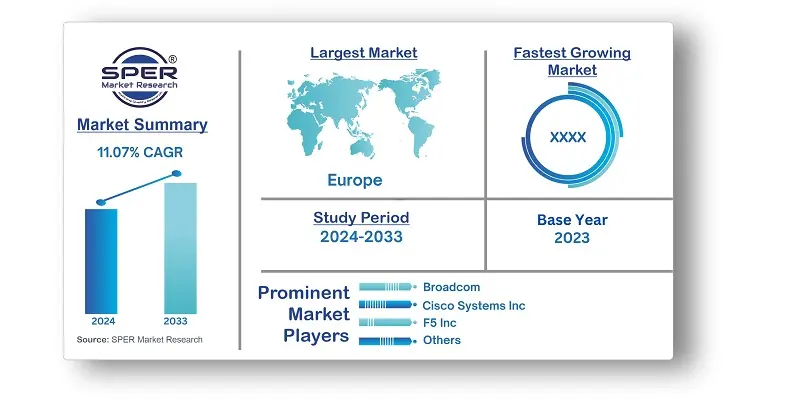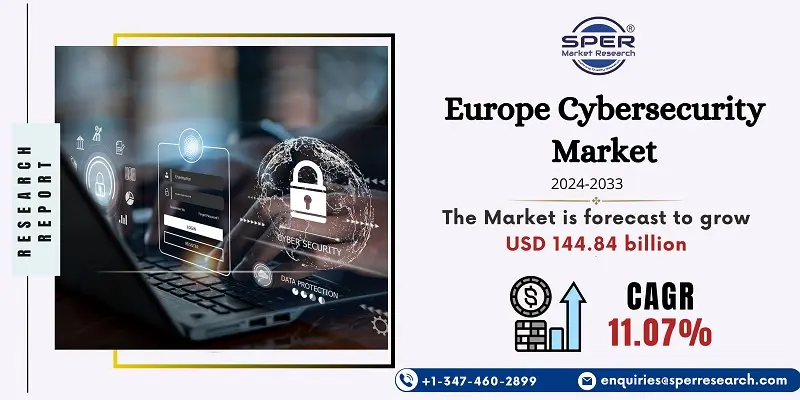
Europe Cybersecurity Market Growth, Size, Trends, Demand, Revenue, Share and Future Outlook
Europe Cybersecurity Market Size- By Offering, By Deployment, By End User- Regional Outlook, Competitive Strategies and Segment Forecast to 2033
| Published: Mar-2024 | Report ID: IACT2453 | Pages: 1 - 157 | Formats*: |
| Category : Information & Communications Technology | |||
- December 2023: The US Cybersecurity and Infrastructure Security Agency (CISA) and the European Union Agency for Cybersecurity (ENISA) inked a Working Arrangement to enhance situational awareness, share best practices, and develop capacity. It's a comprehensive arrangement that builds on short-term structured cooperation in cybersecurity policy implementation through the creation of long-term cooperation in cybersecurity policy implementation techniques.
- December 2023: To enhance situational awareness, share best practices, and build capacity, the US Cybersecurity and Infrastructure Security Agency (CISA) and the European Union Agency for Cybersecurity (ENISA) signed a Working Arrangement. It is a comprehensive arrangement that builds on short-term structured cooperation in cybersecurity policy implementation through the establishment of long-term cooperation in cybersecurity policy implementation techniques.


| Report Metric | Details |
| Market size available for years | 2020-2033 |
| Base year considered | 2023 |
| Forecast period | 2024-2033 |
| Segments covered | By Offering, By Deployment, By End User- |
| Regions covered | Germany, France, Italy, Spain, UK, Rest of Europe |
| Companies Covered | Broadcom, Check Point Software Technologies Ltd, Cisco Systems Inc. Dell Technologies Inc. F5 Inc. Fujitsu Limited (Fujitsu Group), Gen Digital Inc., IBM Corporation, Intel Corporation, McAfee LLC, Palo Alto Networks, Others. |
- Industry Professionals
- IT Managers
- Chief Information Security Officers (CISOs)
- Cybersecurity Analysts
- Network Administrators
- Security Consultants
- Government Agencies
| By Offering: |
|
| By Deployment: |
|
| By End User: |
|
- Europe Cybersecurity Market Size (FY’2024-FY’2033)
- Overview of Europe Cybersecurity Market
- Segmentation of Europe Cybersecurity Market By Offering (Security Type, Services)
- Segmentation of Europe Cybersecurity Market By Deployment (Cloud, On-Premise)
- Segmentation of Europe Cybersecurity Market By End User (BFSI, Healthcare, Manufacturing, Government and Defence, IT and Telecommunication, Others)
- Expansion Analysis of Europe Cybersecurity Market
- Problems and Obstacles in Europe Cybersecurity Market
- Competitive Landscape in the Europe Cybersecurity Market
- Impact of COVID-19 and Demonetization on Europe Cybersecurity Market
- Details on Current Investment in Europe Cybersecurity Market
- Competitive Analysis of Europe Cybersecurity Market
- Prominent Players in the Europe Cybersecurity Market
- SWOT Analysis of Europe Cybersecurity Market
- Europe Cybersecurity Market Future Outlook and Projections (FY’2024-FY’2033)
- Recommendations from Analyst
1.1. Scope of the report1.2. Market segment analysis
2.1. Research data source2.1.1. Secondary Data2.1.2. Primary Data2.1.3. SPER’s internal database2.1.4. Premium insight from KOL’s2.2. Market size estimation2.2.1. Top-down and Bottom-up approach2.3. Data triangulation
4.1. Driver, Restraint, Opportunity and Challenges analysis4.1.1. Drivers4.1.2. Restraints4.1.3. Opportunities4.1.4. Challenges4.2. COVID-19 Impacts of the Europe Cybersecurity Market
5.1. SWOT Analysis5.1.1. Strengths5.1.2. Weaknesses5.1.3. Opportunities5.1.4. Threats5.2. PESTEL Analysis5.2.1. Political Landscape5.2.2. Economic Landscape5.2.3. Social Landscape5.2.4. Technological Landscape5.2.5. Environmental Landscape5.2.6. Legal Landscape5.3. PORTER’s Five Forces5.3.1. Bargaining power of suppliers5.3.2. Bargaining power of buyers5.3.3. Threat of Substitute5.3.4. Threat of new entrant5.3.5. Competitive rivalry5.4. Heat Map Analysis
6.1. Europe Cybersecurity Market Manufacturing Base Distribution, Sales Area, Product Type6.2. Mergers & Acquisitions, Partnerships, Product Launch, and Collaboration in Europe Cybersecurity Market
7.1. Europe Cybersecurity Market Value Share and Forecast, By Offering, 2024-20337.2. Security Type7.2.1. Cloud Security7.2.2. Data Security7.2.3. Identity Access Management7.2.4. Network Security7.2.5. Consumer Security7.2.6. Infrastructure Protection7.2.7. Others
7.3. Services
8.1. Europe Cybersecurity Market Value Share and Forecast, By Deployment, 2024-20338.2. Cloud8.3. On-Premise
9.1. Europe Cybersecurity Market Value Share and Forecast, By End User, 2024-20339.2. BFSI9.3. Healthcare9.4. Manufacturing9.5. Government and Defence9.6. IT and Telecommunication
9.7. Others
10.1. Europe Cybersecurity Market Size and Market Share
11.1. Europe Cybersecurity Market Size and Market Share By Offering (2020-2026)11.2. Europe Cybersecurity Market Size and Market Share By Offering (2027-2033)
12.1. Europe Cybersecurity Market Size and Market Share By Deployment (2020-2026)12.2. Europe Cybersecurity Market Size and Market Share By Deployment (2027-2033)
13.1. Europe Cybersecurity Market Size and Market Share By End User (2020-2026)13.2. Europe Cybersecurity Market Size and Market Share By End User (2027-2033)
14.1. Europe Cybersecurity Market Size and Market Share By Region (2020-2026)14.2. Europe Cybersecurity Market Size and Market Share By Region (2027-2033)14.3. Germany14.4. France14.5. Italy14.6. Spain14.7. UK14.8. Rest of Europe
15.1. Broadcom15.1.1. Company details15.1.2. Financial outlook15.1.3. Product summary15.1.4. Recent developments15.2. Check Point Software Technologies Ltd15.2.1. Company details15.2.2. Financial outlook15.2.3. Product summary15.2.4. Recent developments15.3. Cisco Systems Inc.15.3.1. Company details15.3.2. Financial outlook15.3.3. Product summary15.3.4. Recent developments15.4. Dell Technologies Inc.15.4.1. Company details15.4.2. Financial outlook15.4.3. Product summary15.4.4. Recent developments15.5. F5 Inc.15.5.1. Company details15.5.2. Financial outlook15.5.3. Product summary15.5.4. Recent developments15.6. Fujitsu Limited (Fujitsu Group)15.6.1. Company details15.6.2. Financial outlook15.6.3. Product summary15.6.4. Recent developments15.7. Gen Digital Inc.15.7.1. Company details15.7.2. Financial outlook15.7.3. Product summary15.7.4. Recent developments15.8. IBM Corporation15.8.1. Company details15.8.2. Financial outlook15.8.3. Product summary15.8.4. Recent developments15.9. Intel Corporation15.9.1. Company details15.9.2. Financial outlook15.9.3. Product summary15.9.4. Recent developments15.10. McAfee LLC15.10.1. Company details15.10.2. Financial outlook15.10.3. Product summary15.10.4. Recent developments15.11. Palo Alto Networks15.11.1. Company details15.11.2. Financial outlook15.11.3. Product summary15.11.4. Recent developments15.12. Others
SPER Market Research’s methodology uses great emphasis on primary research to ensure that the market intelligence insights are up to date, reliable and accurate. Primary interviews are done with players involved in each phase of a supply chain to analyze the market forecasting. The secondary research method is used to help you fully understand how the future markets and the spending patterns look likes.
The report is based on in-depth qualitative and quantitative analysis of the Product Market. The quantitative analysis involves the application of various projection and sampling techniques. The qualitative analysis involves primary interviews, surveys, and vendor briefings. The data gathered as a result of these processes are validated through experts opinion. Our research methodology entails an ideal mixture of primary and secondary initiatives.



Frequently Asked Questions About This Report
PLACE AN ORDER
Year End Discount
Sample Report
Pre-Purchase Inquiry
NEED CUSTOMIZATION?
Request CustomizationCALL OR EMAIL US
100% Secure Payment






Related Reports
Our Global Clients
Our data-driven insights have influenced the strategy of 200+ reputed companies across the globe.




















